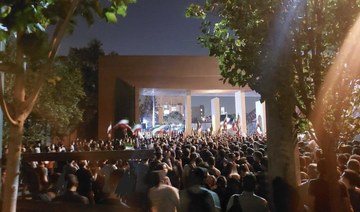NEW YORK CITY: No matter how repressive the Iranian regime is or how brutal its response to dissent, it cannot halt the youth movement that is taking the entire country and its social fabric by storm in pursuit of justice and accountability.
That was the view of UN’s special rapporteur on the situation of human rights in Iran, Javaid Rehman, as protests in the country over the death in police custody of Mahsa Amini entered day 40.
So far, he said, more than 250 protesters have been killed by security forces, including 27 children.
However, this is a “minimum figure” as the true number is probably much higher, he added.
“There are far more, far greater number of casualties and deaths than what I have just said,” Rehman told Arab News on Thursday.
The Iranian regime will not allow him to visit the country and carry out proper verification procedures, although he has been asking for access since he took up his post in 2018.
The ongoing protests are only the latest chapter in a long history of public unrest that has rocked the Islamic Republic since 1999. The response to all such dissent has been the same — brutal crackdowns by the regime that leave many people dead or injured and thousands of political prisoners behind bars.
Students took part in widespread and violent protests in July 1999, for example, and returned to the streets four years later demanding justice for those killed and injured during the earlier demonstrations.
The election of Mahmoud Ahmadinejad as president in 2009 sparked further turmoil that continued well into 2010 and erupted again the following year and in 2012. More recently, an ongoing series of political movements, acts of civil disobedience, online activism and demonstrations took place between 2017 and 2021.
But the current protests over the death on Sep. 16 of Amini, who had been arrested three days earlier for failing to follow strict rules on head coverings, appear to represent a seminal moment that many observers view as a point of no return for the regime in Tehran.
“How many times can you brutalize? How many times can you violate fundamental human rights, people’s fundamental dignity?” said Rehman.
“In the current wave of protests, there is a real issue: What about women and girls of Iran? They have stood up. These are young people who are out on the streets. Women do not want to be oppressed and subjugated. They are young, bright, intelligent women. They see the world is changing, (they follow) social media.
“Iranian authorities, brutal as they are, repressive as they are, they cannot stop young people. They will not be able to stop this movement.”
Giving the prevailing impunity with which the regime continues to act and the lack of accountability for crimes committed during previous protests, the failure of the international community to take action to address this only means there will be more such violations, said Rehman.
“If we do not do anything now, if we just kept silent, then what would happen to all of these millions in Iran? They will continue to be subjugated, brutalized and there is a risk that they will lose hope,” he warned.
Rehman, like all special rapporteurs, is an independent expert who is not a member of UN staff and does not get paid for his work. This week he presented his latest report to the General Assembly Third Committee, which meets in October each year and deals with issues related to human rights, humanitarian affairs and social matters.
His report states that Mahsa Amini was the victim of “state brutality and state repression.” It denounces the brutal crackdown on the protesters who took to the streets following her death under the banner “Women, Life, Freedom.”
It urges Iranian authorities to “immediately stop the use of lethal force in policing peaceful assemblies (and) hold an independent, impartial and prompt investigation in the death of Amini, make the findings of the investigation public and hold all perpetrators accountable.”
This echoes similar calls from the UN and countries worldwide. Rehman said not only has the regime in Tehran ignored such calls but state authorities “clearly ordered security forces to repress the protesters.”
Highlighting the “very serious systemic problems in the role of morality police” tasked with enforcing the strict “hijab law” dress code for women, he said this has been led by President Ebrahim Raisi, who on a number of occasions “has instigated the crackdown on women over (the dress code) and has given a license to this morality police to enforce (the law) more vigorously.”
He added: “If we want integrity and dignity of women to be restored, that law must be abolished.”
Rehman dismissed the findings of an Iranian investigation into Amini’s death that denied there had been any misconduct or wrongdoing on the part of the state. Amini’s family has also rejected this conclusion and called for an investigation by a committee of independent doctors. Their request was denied.
“Therefore, it is clear that the so-called investigations into the death of Jina Mahsa Amini have failed the minimum requirements of impartiality and independence,” said Rehman.
He called on the international community to promptly establish an “independent investigative mechanism into all human rights violations in Iran leading up to, and since, the death of Jina Mahsa Amini.”
Rehman said Amini is not “the first woman who had faced these brutal consequences, nor was she the last one,” as he highlighted the case of 16-year-old Nika Shahkarami, who died in similar circumstances.
“There is evidence coming up, more and more evidence, that she was brutally killed by state security,” he said.

























